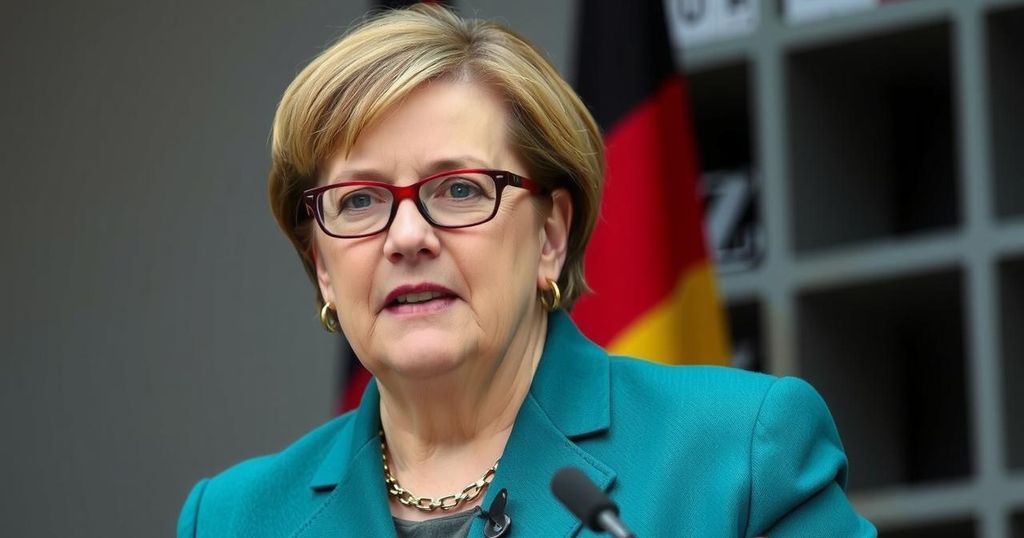Chancellor Olaf Scholz has lost a confidence vote, prompting early elections in Germany on February 23, 2024. The failure of his coalition government, particularly due to disputes over fiscal policies and the withdrawal of the Free Democrats, has created a political crisis. Scholz seeks to present the election as a choice between economic growth and austerity, amidst a contentious political climate and shifting public opinion.
In a significant political shift in Germany, Chancellor Olaf Scholz has been subjected to a confidence vote in parliament, which he did not survive. With this development, early elections are scheduled for February 23, seven months ahead of the original timeline. The vote, which saw Scholz garner support from only 207 out of 733 lawmakers in the Bundestag against 394 who voted against him, followed the disintegration of his coalition government. This coalition had been fragile due to internal disputes over fiscal policies and discontent among coalition partners, particularly following the dismissal of Finance Minister Christian Lindner.
Following Lindner’s removal, the Free Democrats withdrew from the coalition, stripping Scholz of crucial parliamentary support. Although Scholz’s Social Democrats and the Greens will continue to govern in a caretaker capacity, they face significant challenges without formal backing. The Chancellor portrayed the upcoming election as a pivotal moment for voters to decide between a strategy focused on growth versus austerity, emphasizing his plans for substantial investment in Germany’s infrastructure without imposing severe spending cuts, which he attributes to conservative policies.
In the lead-up to this vote, there has been notable contention between Scholz and Friedrich Merz, the leader of the conservative Christian Democratic Union. During a recent debate, both leaders accused one another of incompetence, illustrating the heightened political tension. Scholz articulated, “Shortsightedness might save money in the short term, but the mortgage on our future is unaffordable.” Merz, in turn, criticized Scholz’s fiscal strategies, suggesting they would impose a burden on future generations and lamented the Chancellor’s failure to meet defense reform promises since the onset of the Ukraine crisis.
Current polling indicates that the conservative party holds a lead of over ten percentage points over Scholz’s SPD, with the far-right Alternative for Germany slightly ahead of the social democrats. The upcoming election may significantly reshape Germany’s political landscape, particularly in light of the challenges posed by the AfD’s presence, further complicating coalition negotiations. In the interim, Scholz has proposed a set of urgent measures, including 11 billion euros in tax reductions and enhanced child benefits, aiming to bolster public support ahead of the elections.
The political climate in Germany has been fraught with uncertainty following the collapse of Chancellor Olaf Scholz’s governing coalition. Scholz’s administration—comprising the Social Democrats (SPD), the Greens, and the Free Democrats—became increasingly unstable amid disagreements over fiscal management and investment strategies. The fallout began with significant leadership changes, notably the dismissal of Finance Minister Christian Lindner, which directly precipitated the withdrawal of the Free Democrats from the coalition. This situation necessitated the call for a confidence vote that has now led to early elections, impacting not only Germany’s internal politics but also its standing within the European Union. The upcoming elections present a critical juncture where the electorate’s decisions will shape fiscal policies and governance direction moving forward.
Chancellor Olaf Scholz’s loss of the confidence vote marks a pivotal moment in German politics, leading to the announcement of snap elections in February 2024. The collapse of his coalition government, influenced by internal discord and the withdrawal of the Free Democrats, has left the Social Democrats and Greens to govern without parliamentary backing for the interim period. The forthcoming elections are framed by Scholz as an opportunity for voters to choose between growth and austerity, amidst heightened political tensions and significant electoral competition from conservative factions. The implications of this political restructuring will likely resonate within the broader landscape of the European Union and affect Germany’s economic strategy.
Original Source: www.aljazeera.com






